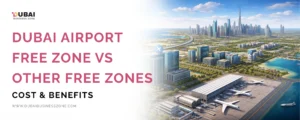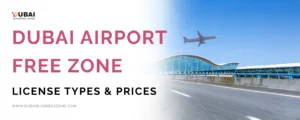
Confused about UAE Freezone company setup?
Understanding how Freezones differ from other Jurisdictions will give you clarity, in this blog you will discover the differences between Mainland, Freezone, and Offshore, and choose the best structure for your business.
Offshore Company
An Offshore Company is structured for entrepreneurs and investors who intend to conduct their business activities entirely outside of the UAE. If you choose this option, you are explicitly not permitted to do any business inside the country.
- Primary Purpose: It is ideal for international trading, serving as a holding company for assets like real estate or shares in other companies, or for “parking your funds” in the UAE. A key reason to establish one is to gain tax exemptions and benefits.
- Key Limitation: All business operations must be conducted outside the UAE. The sources also caution against opening an offshore company if the sole intent is to create a “shell company just for moving across the funds”.
- Cost: The starting price is 5,000 AED and can go up to 105,000 AED, depending on the business activity
Freezone Company

A Freezone Company is presented as the most affordable or “smallest ticket size entry” into the UAE market. It is particularly suitable for businesses that do not require a physical, on-the-ground presence across the entire country.
- Primary Purpose: This option is best for businesses like import-export, wholesale, and consultancies (e.g., IT, HR) or digital marketing. It is not suitable for businesses focused on direct B2C retail.
- Key Benefits:
- 100% Foreign Ownership: A major attraction for investors.
- Tax Exemptions: Offers tax benefits, including exemptions on corporate tax for certain activities and on customs duties for import-export businesses.
- Virtual Presence: A virtual office setup is available, which allows entrepreneurs to run their business from anywhere in the world without needing a physical office.
- Logistical Advantages: Free zones near ports (like Ajman or Jebel Ali Free Zone) provide infrastructure support, allowing businesses to import goods, store them at the port, and re-export them, which saves on logistics and customs costs.
- Limitations: While a free zone company can operate within its zone and internationally, doing business in the mainland may require a third-party distributor.
- Cost: A zero-visa package starts from 5,000 AED in the Northern Emirates (e.g., Ajman, Sharjah) and from 12,900 AED in Dubai. A one-visa package in the Northern Emirates starts around 13,000 AED.
Mainland Company

A Mainland Company, licensed by the Department of Economic Development of the respective emirate, provides the most freedom and authority to operate across the UAE without restrictions.
- Primary Purpose: This is the ideal choice for “on-ground” or brick-and-mortar businesses that have direct customer engagement. Examples include retail shops, restaurants, cafes, and hotels.
- Key Benefits:
- Unrestricted Operations: A mainland license grants the full authority to do business anywhere in the UAE, in the city, in free zones, and internationally—without needing a local agent or distributor.
- Requirements and Considerations:
- Physical Presence: A physical office and an Ejari (tenancy contract) are mandatory before a license can be issued. The sources warn against misleading advertisements offering mainland licenses for as low as 9,000 AED, as these often omit the mandatory Ejari and other costs, leading to hidden fees and potential fines.
- Ownership: While most activities now allow for 100% foreign ownership, some “sensitive activities” still require a local agent or partner.
- Taxation: Mainland companies are subject to corporate tax and VAT, as they generate income and conduct sales within the UAE.
Cost: This is generally the most expensive option. A zero-visa package costs approximately 20,000 AED, and a one-visa package is around 26,000 AED, inclusive of all necessary processes and fees,
| Feature | Offshore Company | Freezone Company | Mainland Company |
| Scope of Business | Exclusively outside the UAE. | Within the free zone and internationally. A third party may be needed for mainland business. | Full authority to operate anywhere in the UAE and internationally. |
| Ideal Business Type | International trade, holding company for assets, tax planning. | Import-export, wholesale, virtual consultancies (IT, HR), digital marketing. | “On-ground” businesses: retail shops, restaurants, cafes, hotels. |
| Physical Presence | Not applicable. | Virtual office setup available; physical office not always required. | Mandatory physical office and Ejari (tenancy contract). |
| Taxation | Tax exemptions and benefits. | Tax exemptions, including corporate tax (for some activities) and customs duties. | Subject to corporate tax and VAT. |
| Ownership | 100% foreign ownership is implied for external operations. | 100% foreign ownership. | 100% ownership for most activities; some “sensitive activities” require a local partner. |
| Cost (Zero-Visa) | Starts from 5,000 AED. | Starts from 5,000 AED (Northern Emirates) or 12,900 AED (Dubai). | Approximately 20,000 AED. |
Most FAQs: UAE Freezone company setup
What is the main difference between Mainland, Freezone, and Offshore companies?
The primary difference is the geographical scope of business operations they are licensed for.
Offshore: You can only conduct business outside the UAE.
Freezone: You can operate within your specific free zone and internationally. To do business on the mainland, you may need a third-party distributor.
Mainland: This license gives you the full authority to do business anywhere in the UAE, in the city, in free zones, and internationally, without any restrictions.
When should I choose an Offshore company?
You should choose an Offshore company if your business activities are conducted entirely outside of the UAE. It is ideal for international trading, setting up a holding company for assets like real estate or global companies, or for obtaining tax exemptions and benefits.
What are the key restrictions of an Offshore company?
The main restriction is that you cannot do any business inside the UAE with an offshore license. The sources also warn against opening one if the sole purpose is to create a “shell company just for moving across the funds”.
What are the major benefits of setting up a Freezone company?
Freezone companies are a popular and affordable option, offering several key advantages:
• 100% foreign ownership of your company.
• Tax exemptions, including on customs duties for import-export businesses.
• The ability to have a virtual office setup, allowing you to run your business from anywhere in the world.
• It is ideal for businesses like import-export, wholesale, and consultancies (IT, HR, digital marketing).
When is a Mainland company the right choice for me?
A Mainland company is the best option if you plan to operate an “on-ground,” brick-and-mortar business such as a retail shop, restaurant, cafe, or hotel. It is necessary for any business that involves direct B2C customer engagement across the UAE.
What are the mandatory requirements for a Mainland license?
Unlike other setups, a Mainland license requires you to have a physical office with a registered Ejari (tenancy contract) before the license can be issued. While most activities allow for 100% foreign ownership, some “sensitive activities” still require a local agent or partner.
How do the costs compare for a basic setup in each zone?
The starting costs vary significantly:
Offshore: Starts from 5,000 AED.
Freezone (Zero-Visa package): Starts from 5,000 AED in Northern Emirates and 12,900 AED in Dubai.
Mainland (Zero-Visa package): A realistic, fully compliant package costs approximately 20,000 AED.
Note: These prices may change based on various factors, so it’s always best to confirm with the official authorities before proceeding.
I see ads for Mainland companies starting at 9,000 AED or less. Are these legitimate?
These advertisements can be misleading. A price of 9,000 AED typically only covers a sole establishment license and omits mandatory costs like the Ejari, which is required by law. Operating without it can lead to fines of up to 15,000 AED and damage your business’s reputation. A complete, end-to-end package that meets all regulatory conditions will cost more.
Can my Freezone company directly sell to customers on the UAE mainland?
Yes, under Executive Council Resolution No. (11) of 2025, Freezone companies can operate on the Dubai mainland if they obtain the appropriate branch license or temporary activity permit.
What are the main tax differences between a Mainland and a Freezone company?
Mainland companies are subject to VAT and corporate tax because they generate income and sales inside the UAE. In contrast, Freezone companies offer tax exemptions, including exemptions on corporate tax for certain activities and on customs duties for import-export businesses






No comment yet, add your voice below!